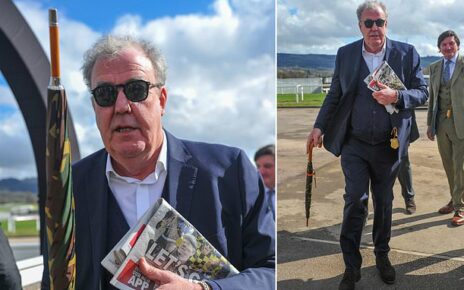Bram Presser’s 2017 debut novel, The Book of Dirt, drawn from his experience as the grandson of Holocaust survivors, has won many awards. But he would never have been able to finish it without getting a studio at Glenfern.
The 1850s Gothic mansion in St Kilda East has been a peaceful home away from home for writers for the past 16 years. At least 150 writers have used its nine studios over time – including this year’s Miles Franklin winner, Jennifer Down – and many have written award-winning and successful books within its walls. As Presser says, it’s unique in Australia in offering long-term, private work spaces, through fellowships or affordable rents.
Writers are concerned about the future of the studios at Glenfern. From left, Melissa Manning, Anna Sublet, Rose Lang, Fiona Wood, Iola Mathews, Stephen Sholl and Isabel Robinson.Credit:Eddie Jim
But now its use as a haven for writers is under threat. The National Trust of Australia (Victoria), which owns the building and grounds, is proposing to install a Steiner kindergarten, child care centre and playground. The writers believe the use of space and noise would make it impossible for the studios to continue.
Although plans for the kindergarten have been going ahead for a year, the Glenfern writers say they were not consulted and were not even aware of the proposal until they noticed strangers on the site and a container load of Steiner equipment in the car park. One of the writers, Anna Sublet, did some digging and discovered the Steiner kindergarten was given two grants totalling more than $1.8 million towards the project from the state education department last year, subject to approval from the Trust and a 10-year lease.
Bram Presser says getting a studio at Glenfern helped him to write The Book of Dirt: “It was like the dam broke almost overnight.″Credit:Louie Douvis
Representatives of the writers, Iola Mathews and Writers Victoria CEO Lucy Hamilton, will speak to the Trust board before its next meeting on August 29 about their concerns. They believe the Steiner project contravenes the will of Amy Ostberg, who bequeathed Glenfern to the Trust in the 1980s.
But aside from the legalities, the writers are appalled at the proposal and argue that if it goes ahead, it will destroy a vital resource for Australian literature. Several authors told The Age Glenfern was the place where they first took themselves seriously as writers and could press ahead and finish projects.
Presser said he had been working on The Book of Dirt for six years, desperate to find peaceful spaces to think and write. Then he won a fellowship to Glenfern. “It was like the dam broke almost overnight… it took only eight months to finish a book I was almost convinced would never see the light of day.
“To have a house almost entirely dedicated to the pursuit of writing, where authors can have long-term tenancies so they can escape their otherwise rowdy home or work spaces and dedicate themselves to their books is truly a gift from the literary gods. To lose Glenfern would be to sever a limb from our country’s literary culture.”
Sian Prior said that Glenfern was critical for her in researching, writing and finishing her first memoir, Shy. “It was a place where there was nothing else I had to do except write. It made me feel at last like I was ‘A Writer’ … it gave me a little community of fellow writers who were all engaged in the same hard, serious, important business of creative writing.”
Jennifer Down says having a writing space “encourages you to view writing as a job or work”.Credit:Simon Schluter
Award-winning novelist Lucy Treloar thinks of her time at Glenfern as when she actually became a writer and began to write with focus, “a huge step for me. The quiet and lack of distraction are an indescribable relief … and there is the mutual respect and understanding between writers, a sort of hum of creative energy.”
Janine Mikosza welcomed the “friendly ghosts” from Glenfern’s past who visited her while she was working on her memoir Homesickness, and enjoyed the camaraderie of the writers’ monthly lunches. Jennifer Down praised Glenfern for putting her on the long path to her Miles Franklin win with a fellowship in 2014. “Having a dedicated workspace validates the time spent there precisely because it encourages you to view writing as a job or work, rather than a hobby or pastime.”
Perhaps the most productive Glenfern writer is YA novelist Fiona Wood, who had a studio for 10 years and wrote four novels and some TV scripts there. She says the support shared between emerging and established writers was “something rare, and central to the Glenfern experience”.
The Trust invited Iola Mathews to set up the writers’ studios in 2003, when she was looking for a room of her own to write. Mathews invited Writers Victoria to be involved, and together they raised $300,000 in donations to renovate the building.
The Trust’s CEO Simon Ambrose said: “As the custodian of 40 historic properties across Victoria, we have a responsibility to actively protect and conserve our places for current communities, as well as future generations.
“We are continually working to identify new ways of using and activating our properties to enhance community connections and to generate sustainable income to support conservation and maintenance. As we undertake that activity we will continue to engage with all relevant stakeholders on the future of Glenfern.”
The Steiner kindergarten in St Kilda did not respond to a request for comment.
Jane Sullivan has been a Glenfern Fellow and tenant.
The Booklist newsletter
A weekly read for book lovers from Jason Steger. Sign up now.
Most Viewed in Culture
From our partners
Source: Read Full Article




